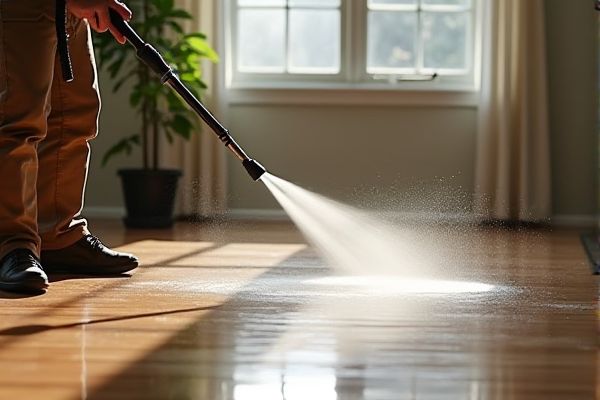
Power-washer cleaners deliver high-pressure water jets that effectively remove tough dirt and grime from surfaces, outperforming hose cleaners in terms of cleaning power and efficiency. Discover how choosing the right tool can save you time and effort by reading the rest of the article.
Table of Comparison
| Feature | Power Washer Cleaner | Hose Cleaner |
|---|---|---|
| Cleaning Power | High pressure, effectively removes tough dirt and stains | Lower pressure, suitable for light cleaning tasks |
| Water Usage | Uses less water efficiently due to high pressure | Consumes more water as it relies on continuous flow |
| Surface Suitability | Best for concrete, decks, vehicles, and heavy-duty surfaces | Ideal for plants, garden furniture, and gentle surfaces |
| Portability | Heavier, less portable, often needs power source | Lightweight, highly portable, connects directly to faucet |
| Cost | Higher initial cost and maintenance expenses | Lower cost, minimal maintenance |
| Ease of Use | Requires some skill and setup | Simple to use, plug-and-play |
Introduction to Power-Washer vs Hose Cleaner
Power-washer cleaners deliver high-pressure water jets ranging from 1,300 to 3,000 PSI, effectively removing tough dirt, grime, and stains from surfaces like driveways, patios, and vehicles. Hose cleaners operate at much lower pressure, typically below 100 PSI, best suited for light cleaning tasks such as rinsing plants or washing cars without causing damage. Choosing between a power-washer and a hose cleaner depends on the cleaning intensity required, surface type, and water consumption considerations.
How Power-Washers Work
Power-washers operate by using a high-pressure water pump to increase water flow and force, delivering powerful jets that remove dirt, grime, and mold from surfaces more effectively than hose cleaners. Unlike hose cleaners, which rely on standard water pressure, power-washers utilize PSI (pounds per square inch) ratings typically ranging from 1,300 to 4,000, allowing for deep cleaning and faster results. The motor or engine drives the pump, which pressurizes the water before releasing it through a specialized nozzle that can adjust spray patterns for various cleaning tasks.
How Hose Cleaners Operate
Hose cleaners operate by attaching directly to your garden hose, using water pressure to spray a targeted, rotating jet that effectively removes dirt and grime from surfaces. These devices rely on the water flow alone, without additional power sources, making them energy-efficient and easy to use for light to moderate cleaning tasks. You can expect a steady, controlled stream that is ideal for washing patios, decks, and outdoor furniture with minimal effort.
Cleaning Efficiency Compared
Power-washer cleaners provide superior cleaning efficiency compared to hose cleaners by delivering high-pressure water jets that effectively remove stubborn dirt, grime, and stains from surfaces. Hose cleaners rely on lower water pressure, making them less effective for heavy-duty cleaning tasks and more suitable for light rinsing and watering. Choosing a power-washer cleaner can significantly reduce cleaning time and effort, ensuring your surfaces are thoroughly cleaned with minimal hassle.
Water Usage and Environmental Impact
Power-washer cleaners use significantly less water than hose cleaners, often consuming around 2-5 gallons per minute compared to hose cleaners that can use 10-20 gallons per minute. This reduced water usage makes power-washers more environmentally friendly by minimizing water waste and lowering runoff pollution. Furthermore, power-washers often operate with higher pressure, allowing more efficient cleaning that reduces the need for harsh chemicals, benefiting both water conservation and environmental health.
Cost Analysis: Power-Washer vs Hose Cleaner
Power-washer cleaners typically have a higher upfront cost, ranging from $100 to $500, depending on pressure and features, while hose cleaners are generally more affordable, often priced under $50. Power washers deliver stronger cleaning power, reducing time spent on tasks and potentially lowering labor costs, whereas hose cleaners are less efficient for heavy-duty grime but sufficient for light cleaning and smaller budgets. Evaluating your cleaning needs and frequency will help determine if the investment in a power washer justifies the higher initial expense compared to a more economical hose cleaner.
Ease of Use and Accessibility
Power-washer cleaners offer powerful cleaning capabilities ideal for tough grime but often require a stable water source and familiarization with pressure settings, which might pose a learning curve for some users. Hose cleaners, on the other hand, provide greater accessibility and ease of use, as they attach directly to a standard garden hose and are generally lightweight, making them suitable for quick, everyday cleaning tasks. Your choice depends on balancing the need for efficiency against simplicity and convenience in maintaining outdoor surfaces.
Safety Considerations
Power-washer cleaners pose higher safety risks due to their high-pressure water jets, which can cause severe injuries if mishandled, whereas hose cleaners operate at lower pressure, making them safer for general use. Proper protective gear, such as gloves and goggles, is essential when using power washers to prevent accidents and debris-related harm. You should always follow manufacturer guidelines and maintain secure footing to avoid slips and falls with either cleaning method.
Ideal Applications and Best Use Cases
Power-washer cleaners excel in removing tough grime, mold, and stains from concrete driveways, decks, and vehicles, making them ideal for heavy-duty outdoor cleaning tasks. Hose cleaners are best suited for gentle washing of plants, patios, and car exteriors where lower pressure prevents damage to surfaces. Choosing between the two depends on the required pressure level and the surface sensitivity for efficient and safe cleaning results.
Conclusion: Choosing the Right Cleaner
A power-washer cleaner delivers high-pressure water that efficiently removes tough dirt, grease, and grime, making it ideal for heavy-duty cleaning tasks on concrete, vehicles, and outdoor furniture. Hose cleaners provide a gentler water flow, suitable for light cleaning jobs like washing plants, patios, or delicate surfaces that require less pressure. Your choice depends on the intensity of the cleaning needed, surface durability, and frequency of use to ensure optimal results without causing damage.
 homyna.com
homyna.com